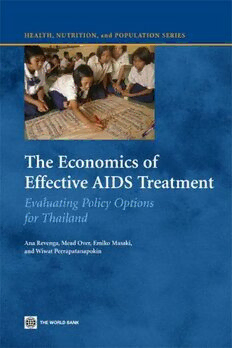
The Economics of Effective AIDS Treatment: Evaluating Policy Options for Thailand (Health, Nutrition, and Population) PDF
270 Pages·2006·5.378 MB·English
Most books are stored in the elastic cloud where traffic is expensive. For this reason, we have a limit on daily download.
Preview The Economics of Effective AIDS Treatment: Evaluating Policy Options for Thailand (Health, Nutrition, and Population)
Description:
HIV is the leading cause of premature death in Thailand. Since the first case of AIDS was reported in 1984 more than one million Thais have been infected. The social, human and economic costs of this burden are enormous. The Thai government has shown a strong commitment to providing care and support to persons living with HIV/AIDS by launching the National Access to Care Program (NAPHA) in 2003, which provides for publicly financed antiretroviral therapy (ART) to all HIV-infected people. This book documents through interviews how ART has radically changed the lives of those living with HIV. In the words of an HIV positive 29-year old man, ART is a 'miracle'. The book then develops an innovative analytical framework and uses it to show how the future sustainability and cost-effectiveness of this ambitious program depend critically on Thai government choices of AIDS treatment policy, HIV prevention policy and AIDS drug pricing. For the most likely assumptions, the book estimates that ART will save years of healthy life at a cost of between $700 and $2,400 per year. Successful AIDS treatment accumulates ever-increasing numbers of patients who need subsidized ART. Despite the magnitude of the resulting fiscal burden, the authors judge this expenditure to be a worthwhile public health investment for Thailand. However, they show that the future sustainability of the program will hinge critically on how well the government manages the quality of ART service delivery, on whether it is able to sustain its past successes in HIV prevention and on its negotiations with multinational pharmaceutical manufacturers on the prices of new AIDS drugs.
See more
The list of books you might like
Most books are stored in the elastic cloud where traffic is expensive. For this reason, we have a limit on daily download.
